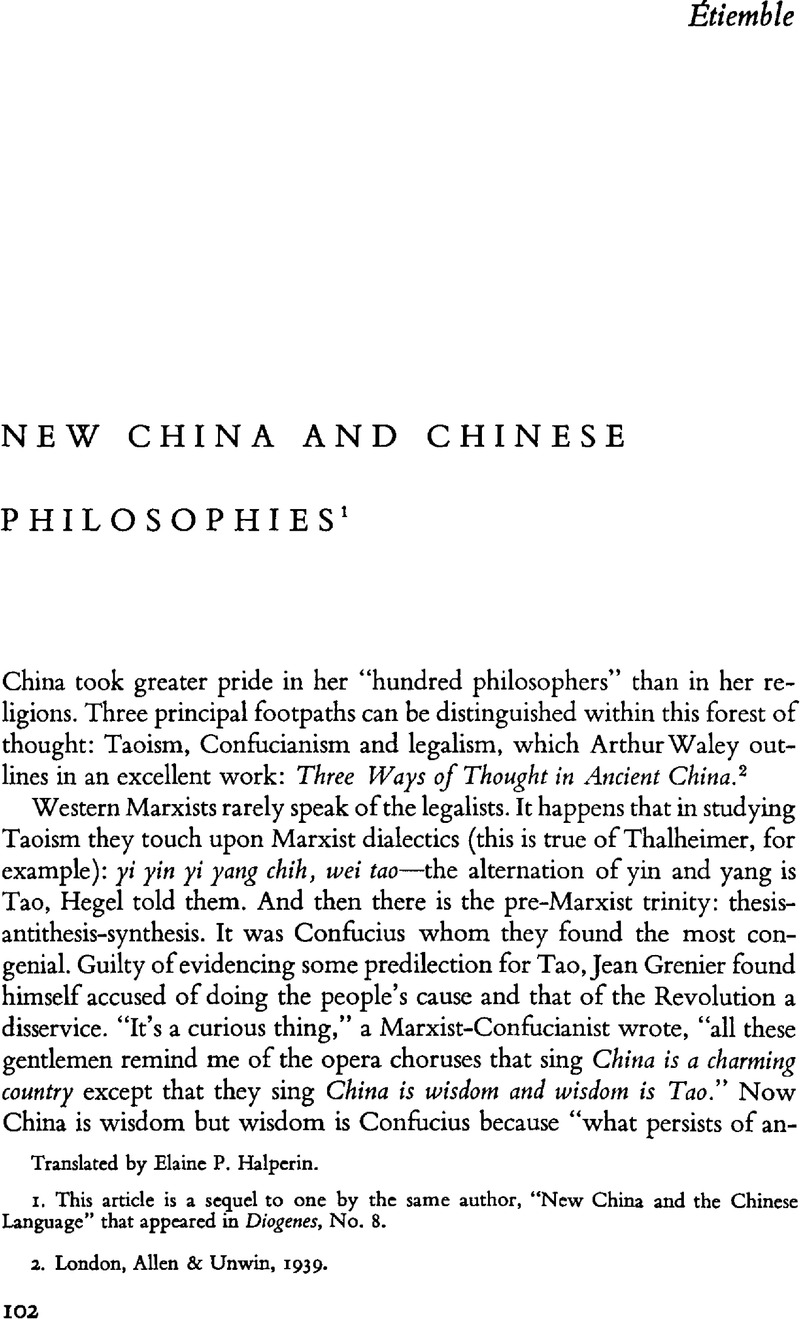No CrossRef data available.
Published online by Cambridge University Press: 03 July 2024

This article is a sequel to one by the same author, "New China and the Chinese Language" that appeared in Diogenes, No. 8.
2. London, Allen & Unwin, 1939.
3. François La Mothe Le Vayer: Œuvres (Dresden, Michel Groell, 1757), Vol. I, Part I, pp.311-24.
4. Confucius, the Man and the Myth (New York, The John Day Co., 1949). Read particu larly chaps. X, "The Reformer," and XV, "Confucius and Western Democracy."
5. May-June, 1954, pp. 79-87.
6. Œuvres Choisies, Vol. I, pp. 347-64, "A propos de la pratique" (Paris, Editions sociales, 1955). One can see by this that the logician, the disciple of Stalin, more than yields to the strategist, the statesman.
7. Biographie du maçon Le kou wen chinois (Paris, Geuthner, 1926), pp. 195-98.
8. Chicago, University of Chicago Press, 1935, pp. 245-46.
9. Traité des examens traduit de la nouvelle histoire des T'ang (Paris, Bibliothèque de l'Institut des Hautes Etudes Chinoises), chaps. XLIV-XLV, P.U.F.
10. In Geneva there is a Société d'Etudes confucéenes, Case 26, Grange Canal, whose Bulletins I receive: Nos 25-26, dated the fourth and fifth months of the Confucian year 2506.
11. Li Ki, Ju Hsing.
12. "Is the Communist Party in agreement with the three principles ofthe people? We answer yes." Œeuvres choisies, "Les Taches du Parti Communiste chinois" (Paris, Editions sociales, 1955), p. 320.
13. Pekin, Foreign Language Press.
14. Mencius, IV, 2, 32.
15. Studies in Chinese Thought, edited by Arthur F. Wright (Chicago, University of Chi cago Press, 1954), pp. 140, 300.
16. Ibid.
17. Leyde, Brill; Paris, Belles Lettres, with the collaboration of Editions Sulliver, 1950.
18. Tao Tö King, Le Livre de la Voie et de la Vertu (Paris, Adrien-Maisonneuve, 1953), with Chinese text verified and translated by J. J. L. Duyvendak, with his critical notes and an in troduction.
19. Clefs pour la Chine, pp. 240, 244, 246. Whoever does not know the Chinese language admires in Lao Tzŭ a "great rhythm." Those who know the language are still looking for the real rhythm of this work.
20. Ibid.
21. Ibid.
22. Fung Yu-lan, Precis, p. 84.
23. Cf. Henri Maspéro, La Chine antique (Paris, de Brossard, 1923), pp. 108-11, and Chen Yao Lung: Le régime agraire en Chine (Lyon, 1933).
24. Cf. Liu Lien-tching's thesis in the Greniers publics de prévoyance.
25. Mao Tse-tung, "A propos de la Contradiction," Œuvres choisies, Vol. I, p. 368; Fong Yeou Lan: Mao Tse-toung et la philosophie chinoise, p. 82.
26. Review of Duyvendak's translation, in Toung Pao, Vol. XLIII, bks. 1-2, p. 103.
27. What we need in this instance is one word that would mean both intentional and active. We don't have such a word.
28. "Contemplative Taoism and purposive Taoism are not merely different. Logically and essentially they are incompatible." Herrlee G. Creel, "On Two Aspects in Early Taoism," Silver Jubilee Volume of the Zinbun-Kagaku-Kenkyusyo (University of Kyoto, 1954).
29. T'oung Pao, Vol. XLIII, bk. 1-2, p. 95. It is evidently to this passage of the T'oung Pao that the American Sinologist Derk Bodde answers in "Two New Translations of Lao Tzŭ," Journal of the American Oriental Society, Vol. LXXIV, No. 4, Oct.-Dec., 1954, pp. 211-17: "Two major points are abundantly clear: Why, on the one hand, these translations are so ex citingly different from all previous Western study on the Tao Te Ching and open for it revolu tionary new possibilities; yet why, on the other hand, they cannot be regarded as ‘definitive' translations and fail to make the work of previous translators obsolete."
30. Review of Duyvendak's translation, in La Nouvelle N.R.F., Feb. 1955, pp. 324-28.
31. "Dogmatic certainty is never appropriate when one is dealing with Taoism" (Creel); ‘'many … statements must probably remain veiled forever in uncertainty" (Derk Bodde).
32. Cf. Mao Tse Toung et la philosophie chinoise, p. 82.
33. Clefs pour la Chine, p. 238.
34. Précis, p. 320.
35. Mao Tse Toung et la philosophie chinoise, p. 85.
36. Ibid., pp. 82-83, and Précis, p. 221.
37. Précis, p. 78.
38. E. V. Zenker, Histoire de la philosophie chinoise (Paris, Payot, 1932), p. 194.
39. Précis, p. 171.
40. Probsthain Oriental Series, 1928.
41. Three Ways of Thought in Ancient China, pp. 199-247.
42. George E. Taylor understood that the Chinese Communist Party "stems from the traditional bureaucratic leading class."
43. H. G. Creel, Chinese Thought, p. 180.
44. Les Ecrivains illustres (Mazenod, 1951), Vol. I, p. 229.
45. The Abortiveness of Empiricism in Early Ch'ing Thought.
46. Chinese Thought, p. 257.